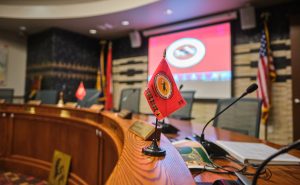By CHRIS AADLAND
Confederated Umatilla Journal
PENDLETON, Ore. – The White House on Wednesday directed the government to prioritize working to revitalize salmon populations in the Columbia River Basin, a move a tribal leader called the biggest commitment the federal government has made to restoring native fish species facing extinction.
Through a memorandum, President Joe Biden ordered federal agencies to “utilize existing authorities and available resources – and assess what additional authorities and resources may be needed” to help restore more than a dozen endangered and threatened fish species in the basin.
According to the related White House media release, those fish species, like salmon and steelhead, have been severely depleted since 1855 due to dam construction, overfishing and population growth in the basin. The degraded ecosystem and lack of salmon and other native species, which are irreplaceable parts of the culture, religion and economy of tribal nations in the region, has substantially harmed the ability of tribes to exercise treaty hunting and fishing rights.
Confederated Tribes of the Umatilla Indian Reservation Board of Trustees Chair Kat Brigham said the announcement was a huge development because it’s the first time the federal government has committed to working on a comprehensive plan to prevent salmon from disappearing permanently.
“It’s the first time we’ve ever got a presidential memorandum saying they’re going to rebuild Columbia River Salmon,” she said.
In his memorandum, Biden directed the federal government to develop a partnership with Columbia Basin tribes and states to meet restoration fish goals for a river and basin the White House called the “lifeblood of the Pacific Northwest” due to its role in spurring economic development, the access to water for the region’s important agriculture industry it provides, its recreational opportunities and the abundant and cheap power the basin’s dams generate.
“The Presidential Memorandum is part of the Biden-Harris Administration’s unprecedented commitment to honor the United States’ obligations to Tribal Nations and protect and restore America’s natural wonders for future generations, while also recognizing the important co-benefits that the Columbia River provides to communities and businesses throughout the region,” the statement announcing the directive said. “It establishes that it is the policy of this administration to work with the Congress and with tribal nations, states, local governments, and stakeholders to pursue effective, creative, and durable solutions to restore wild fish populations while delivering affordable and reliable clean energy, supporting the local agriculture economy, and meeting the many resilience needs of the region.”
The directive comes just days after the federal government pledged $200 million to three tribes – the Confederated Tribes of the Colville Reservation, the Coeur d’Alene Tribe and the Spokane Tribe of Indians – to restore salmon and steelhead in the upper portion of the basin in a deal that included a 20-year stay in litigation. Those tribes’ access to salmon was severed in ceded and reservation lands with the construction of two dams at the turn of the 20th century that didn’t include any way for the salmon to migrate back past the barriers.
The Biden Administration had also previously recognized in 2022 and 2023 the dire situation facing salmon and other native fish species in the basin and expressed a desire to work with stakeholders to help populations recover.
Wednesday’s announcement also comes after the release of two high-profile reports last year that recommended the breaching of the four dams on the Lower Snake River to aid salmon recovery as well as laying out a vision for how to replace the energy generation that would be lost with the destruction of those dams.
While the CTUIR hasn’t taken an official stance on whether, or when, dams should be breached, it has pressed – alongside about a dozen other Columbia Basin tribes – for the federal government to urgently address dwindling salmon populations before they go extinct. That strategy has included calling for a comprehensive federal legislative solution designed to restore salmon populations while also defining a long-term plan for dams in the basin and addressing the region’s power and farming needs are met in any solution.
The memorandum is the result of years of consultation and meetings with the federal government and tribes, interest groups and other stakeholders, where they’ve communicated the injustices over generations stemming from decreased access to fishing sites and fewer salmon in river, and that a solution was needed urgently to address problems – and that any solution needed to be a comprehensive one that involved all the basin’s stakeholders.
In the meantime, Brigham said the CTUIR and the other tribes in the basin are united behind a strategy that includes seven main principles and they have been racing to implement their own solutions while waiting for more coordinated and comprehensive action from the federal government.
She said Wednesday’s announcement makes it clear that formulating a solution will include input from all those with a stake in the basin’s future, which she said is important, given the wide range of ways the basin and its natural resources are used.
“I’m just really pleased that we’re going to be able to move forward, and looking at the Columbia Basin as a whole,” Brigham said. “I’m really glad it happened. Now that it’s happened, the real work begins.”
Others, like conservation and environmental groups, that have called for the federal government to address the crisis also applauded the announcement as a sign that the future of native fish populations in the basin is a national priority.
“Conservation and fishing advocates from across the Northwest and the nation applaud the historic Memorandum issued by President Biden today,” said Tanya Riordan, Save Our Wild Salmon’s Policy and Advocacy Director, in a media release. “With this directive, the President is sending a clear message to the Bonneville Power Administration, Army Corps of Engineers and other relevant agencies and leaders within the federal government that business-as-usual is no longer acceptable… A ‘whole of government’ approach is required, and agencies must immediately align priorities, plans, and actions to ensure the United States is meeting its treaty obligations to Pacific Northwest Tribes.”




